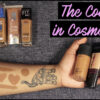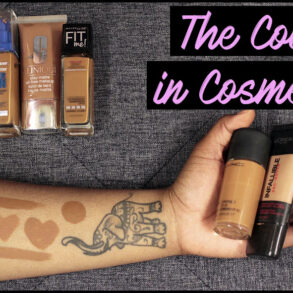In the spring of 2019, I sometimes found myself transfixed by the corner of Canal and Lafayette streets in Soho, either marveling at a line of people or in it. This was the New York headquarters of Glossier, the makeup brand of the millennial pink zeitgeist. Founded by Emily Weiss in 2014 with just four products, Glossier was – and, to an extent, still is – the purveyor of minimalist makeup in the 2010s: crisp sans serif advertising, direct-to-consumer delivery (in distinctive pink bubble packaging), a model of goddess-like, preternatural dewiness.
I wasn’t a devotee of the brand so much as a lurker entranced by its omnipresence; by way of word of mouth and online buzz, their Milky Jelly Cleanser and Lash Slick mascara found their way into my makeup bag. Their Boy Brow gel, which promised the full, fluffy arches of the era, was more than one friend’s staple product. Actually, a lot of people’s staple product – by March 2019, after a $100m series D funding round led by the venture capital giant Sequoia Capital, Glossier (pronounced “gloss-ee-ay”, as if French) was valued at $1.2bn. The company was “the one everyone thinks of as being the brand of the era”, says Marisa Meltzer, a longtime beauty industry reporter and the author of a new book on the rise of Glossier and Weiss, its ambitious, aloof and inscrutable founder who participates, albeit ambivalently, in the retrospective.
Glossy: Ambition, Beauty, and the Inside Story of Emily Weiss’s Glossier is, like the brand it tracks, slick and direct, summarily charting Weiss’s trajectory from exceptionally focused Connecticut schoolgirl, the daughter of a business executive and a homemaker, to prodigious intern in the Condé Nast fashion sphere of the 2000s to prepossessing entrepreneur. (And, for a brief time, the competent foil to a guileless Lauren Conrad on the MTV reality show The Hills; part 1 is cannily titled “the Superintern”.) Her blog Into the Gloss, founded in 2010, became a beauty and clout destination, coupling just-so varnished celebrity and media fixtures interviews with product recommendations. Into the Gloss had the tricky elixir of lifestyle and 1.3 million monthly visitors by 2016. At 29, Weiss leveraged that notoriety – her brand, her posture as an in-the-know girlfriend, her image as a breezy, cool CEO with a thin figure and glowing skin – into a company with actual products.
Those products caught on, their quality enhanced by the company’s framing as something more than a makeup brand; it wasn’t quite a movement, à la WeWork or some of the other hyper-masculine, unicorn “disruptors” of the 2010s, but still a world unto itself. It was makeup as empowerment, “skin first, makeup second”. The pink jumpsuit-wearing “editors” at their few retail stores were your collaborators, and the brand was your friend. Within five years, it had a billon-dollar valuation. “The pace of Glossier just never ceases to blow my mind,” said Meltzer.

Glossier “was really good at being the first skincare products that were going to be just for you”, said Meltzer, something between the anti-acne creams of millennial youth and anti-ageing serums of the generation above them. “So much of Glossier is this odd dance in their branding of ‘you’re beautiful and perfect! Also, buy our stuff to confirm that you’re beautiful and perfect’” she said. “It’s very ‘you can sit with us,’ but in order to even metaphorically sit with them you’re supposed to give something away, whether it’s your money or, if you’re following them on social media, your time.”
The dance tired. Like a good girlfriend, Glossy is forthright and insidery on the company’s growing pains and Weiss’s fraught tenure as an Instagram-chic CEO, inspiring desire and envy as well as scorn. (Meltzer does not fail to note Weiss’s notoriously arcane and punitive pre-wedding process, which she posted to Into the Gloss in 2016 and which was roundly mocked online). The New York Times accurately describes the book as “dishy” in its account, based on dozens of interviews with former employees, of issues within the company (barely functioning HR, disorganized leadership; Weiss as cold and weird but never mean; a company culture that prioritized normative beauty and social media followings). It fairly recounts the vibe shifts that eroded Glossier’s market dominance from its late 2010s peak: how the “no-makeup” makeup look gave way to the glitter maximalism of the Euphoria teens, how the “authenticity” of a candid photo dump overtook Weiss and Glossier’s atmospheric, polished Instagram aesthetic. The company laid off a third of its corporate staff in January 2022; its market share and relevance declined, while outsiders postulated its once rosy future.
And then there was the pushback to female-led companies positioned as ethical, kind or aspirational. Or, more simply, to the respect of the “girlboss” embodied by Weiss. Meltzer devotes the final section of the book to dissecting both the reductive rise and fall of the “girlboss” (“the very word is demeaning – there’s no boy boss,” she said) and the company’s real shortcomings. By 2020, Glossier had shuttered its flagship store due to the pandemic, and the company weathered social upheaval typical to that summer: substantive criticisms of racial bias, lack of shade range, tokenism, low pay and a mean-girl culture, delivered via an anonymous Instagram called @outtathegloss that advocated for a boycott.
The critiques depressed sales, and were lumped in with the various sins, real or perceived, of contemporaneous passé (and still rare) female business icons, such as Away’s Steph Korey (toxic workplace, overblown importance), The Wing’s Audrey Gelman (political hypocrisy), Man Repeller’s Leandra Medine (more toxic workplace problems regarding race) and Sheryl Sandberg (working for Facebook). Meltzer analyzes this backlash as partly fair, and partly outsized. “In some ways signaling the end of the era of the girlboss was like saying female ambition was – poof! – out of style,” she writes. “When a woman fails, she’s just a crazy bitch or an amateur. Either way, she had it coming.”




The term girlboss “was this way for these women to achieve business fame, which doesn’t happen a lot, because business fame has always been more about the guys who start tech companies in their garage in the 80s or 90s,” she said. “Now we’re seeing that kind of negative space … who wasn’t included and why weren’t they,” such as women of color, women in rural places, those not conventionally beautiful and, crucially, those who didn’t retain publicists.
Weiss weathered the storm, which Meltzer attributes in part to the brand’s fortitude, and in part her cultivated, distanced persona. The author is evidently fascinated and stymied by her subject. Meltzer describes Weiss as “a skilled operator”, “steely one minute” and pouring with emotion the next. She was “preternaturally good at reading people” and “knew when to intimidate and when to wield her big smile”. She could, Meltzer admits, trigger adolescent insecurities. And she could be frustratingly opaque; Meltzer describes one interview with Weiss in November 2022, after she stepped down as Glossier’s CEO and had her first child, as “truly amazing exercises in obfuscation”.
Which made pinning down Weiss, or the precise phenomenon of Glossier, a tricky task. “My job would’ve been a lot easier if I came down on a sort of black or white, hero or villain narrative, but that’s not how I felt about Glossier or Emily Weiss, and part of why I was so drawn to the story,” she said. “It was both – there were missteps and there were successes. She could be a really brilliant visionary figure, and she could also be oblivious and dismissive and out for herself.”
The book, she hopes, will push readers to “question our collective desires for neat categories to put people and businesses into”. Glossier is, at the end of the day, a place of employment and a collection of products. That its popularity engendered so many feelings, from loyalty to derision, says as much about the consumer as the good.
-
Glossy: Ambition, Beauty, and the Inside Story of Emily Weiss’s Glossier is out now
This post was originally published on this site be sure to check out more of their content.








